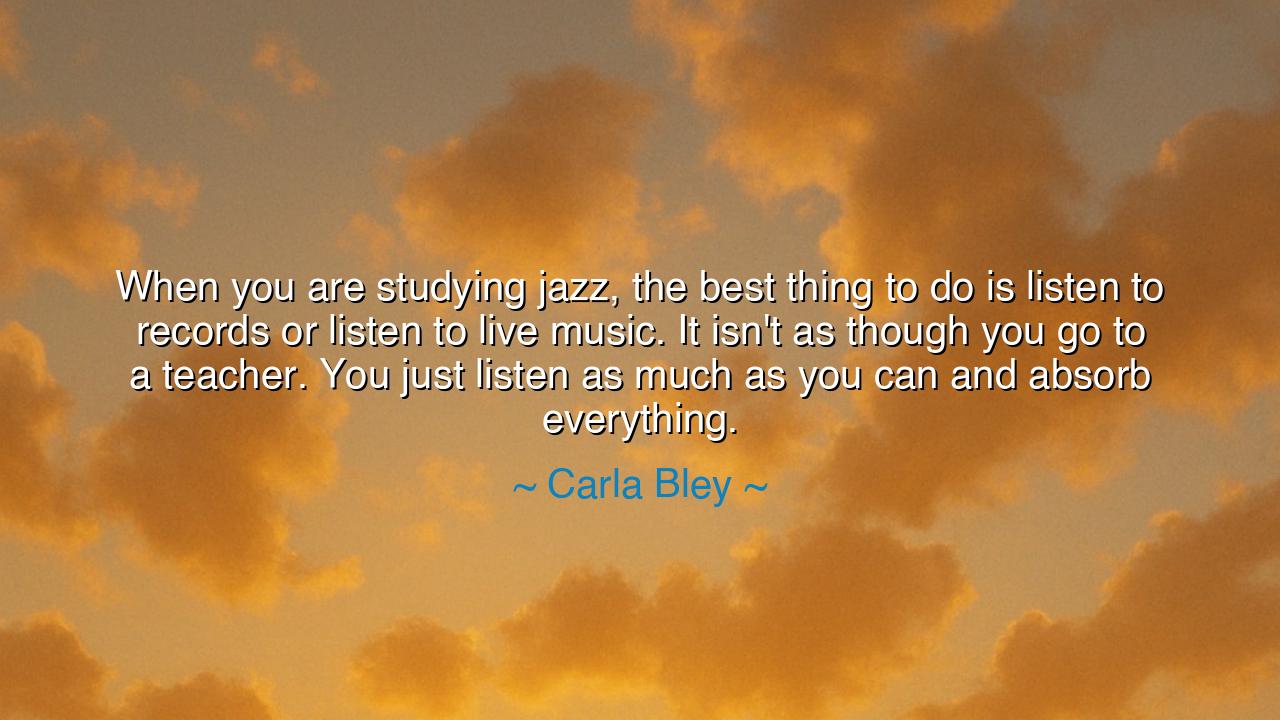
When you are studying jazz, the best thing to do is listen to
When you are studying jazz, the best thing to do is listen to records or listen to live music. It isn't as though you go to a teacher. You just listen as much as you can and absorb everything.






In the words of Carla Bley, the composer and improviser whose music carried both daring and grace, we hear a truth that extends far beyond the realm of sound: “When you are studying jazz, the best thing to do is listen to records or listen to live music. It isn’t as though you go to a teacher. You just listen as much as you can and absorb everything.” These words remind us that the deepest knowledge is not always learned by direct instruction, but by immersion, by surrender, by opening oneself completely to the living essence of the art.
To study jazz, Bley tells us, is not the same as studying mathematics or grammar. Jazz is not bound in formulas—it is a conversation of the soul, an ever-unfolding dialogue between instrument, player, and listener. Thus the path to mastery is not in textbooks, but in listening, for jazz is learned as a child learns language: by hearing, by imitating, by absorbing the rhythm until it becomes a heartbeat within. In this way, the art of jazz reflects the art of life itself, for much of what we become comes not from instruction, but from the company we keep and the voices we attune our ears to.
The power of listening has been proven through the ages. Consider the young Wolfgang Amadeus Mozart, who, before he could even write, listened with rapture as his father played and composed. He absorbed the cadences of music long before he studied its rules. What Mozart heard shaped him more profoundly than what he was ever taught, and by listening, he found freedom to surpass even the structures his teachers revered. So too with jazz: it is a music that lives not in rigid systems but in the act of hearing and responding, of flowing with the living current.
Bley’s words also remind us of the sacred nature of experience. To sit at the feet of a master is valuable, but to sit in a smoky club where horns cry and drums thunder is transformative. For there, the student does not merely learn notes—they absorb courage, timing, tension, and release. They hear the unspoken conversation of musicians creating in the moment. This cannot be captured in written lessons; it must be lived, it must enter the soul by sound, by presence, by the act of surrendering fully to the experience of listening.
History gives us another shining example in Charlie Parker, whose genius was forged not in classrooms, but in late-night jam sessions, where he listened endlessly, mimicking and absorbing the innovations of others until he carved his own voice. His education was not given—it was taken, drawn in like breath, through the discipline of listening without end. And by this method, he gave birth to bebop, reshaping jazz itself.
Thus, the meaning of Bley’s teaching is clear: some truths cannot be taught directly. They must be caught like sparks in the air, absorbed through immersion, and made one’s own by patient practice. The teacher, in this case, is not a person but the music itself. To listen deeply is to enter into apprenticeship with the art, with the voices of those who came before, whose records and performances continue to speak across time.
The lesson for us is this: if you would learn something deeply, then immerse yourself in its living form. Do not rely only on explanations, but listen, observe, absorb. For listening shapes the heart, not just the mind. In practice, this means seeking out the voices of the wise, surrounding yourself with the living expressions of the art or craft you pursue, and training your ear not only to the words spoken, but to the spirit behind them.
Thus, Carla Bley’s words ring like an ancient exhortation: “Just listen as much as you can and absorb everything.” Let them remind us that knowledge is not always written, nor always taught in classrooms, but is found in the living stream of experience. To those who are patient, humble, and attentive, the world itself becomes a teacher, and through the act of listening, one may find not only skill, but wisdom.






AAdministratorAdministrator
Welcome, honored guests. Please leave a comment, we will respond soon